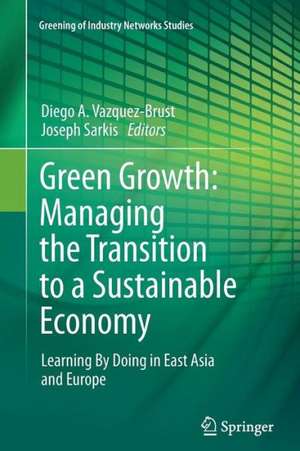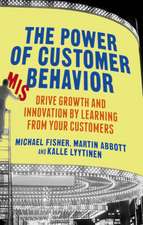Green Growth: Managing the Transition to a Sustainable Economy: Learning By Doing in East Asia and Europe: Greening of Industry Networks Studies, cartea 1
Editat de Diego A. Vazquez-Brust, Joseph Sarkisen Limba Engleză Paperback – 11 iun 2014
| Toate formatele și edițiile | Preț | Express |
|---|---|---|
| Paperback (1) | 1220.45 lei 6-8 săpt. | |
| SPRINGER NETHERLANDS – 11 iun 2014 | 1220.45 lei 6-8 săpt. | |
| Hardback (1) | 1225.16 lei 6-8 săpt. | |
| SPRINGER NETHERLANDS – 25 mai 2012 | 1225.16 lei 6-8 săpt. |
Preț: 1220.45 lei
Preț vechi: 1488.34 lei
-18% Nou
Puncte Express: 1831
Preț estimativ în valută:
233.56€ • 253.61$ • 196.19£
233.56€ • 253.61$ • 196.19£
Carte tipărită la comandă
Livrare economică 22 aprilie-06 mai
Preluare comenzi: 021 569.72.76
Specificații
ISBN-13: 9789400797826
ISBN-10: 9400797826
Pagini: 372
Ilustrații: XXX, 342 p.
Dimensiuni: 155 x 235 x 20 mm
Greutate: 0.52 kg
Ediția:2012
Editura: SPRINGER NETHERLANDS
Colecția Springer
Seria Greening of Industry Networks Studies
Locul publicării:Dordrecht, Netherlands
ISBN-10: 9400797826
Pagini: 372
Ilustrații: XXX, 342 p.
Dimensiuni: 155 x 235 x 20 mm
Greutate: 0.52 kg
Ediția:2012
Editura: SPRINGER NETHERLANDS
Colecția Springer
Seria Greening of Industry Networks Studies
Locul publicării:Dordrecht, Netherlands
Public țintă
ResearchCuprins
1. Green Growth: Managing the Transition to Sustainable Economies.- 2. A Critical Review and New Policy Framework of Low-Carbon, Green-Growth Strategy of Korea.- 3. Greening the Korean Stacks Through Lessons From the EU Emission Trading System: A Socio-Legal Analysis.- 4. Sustainability Science Integrated Policies Promoting Interaction-Based Building Design Concept as a Climate Change Adaptation Strategy for Singapore and Beyond.- 5. Analysis of Technical Efficiency and Productivity Using Meta-Frontier-Manufacturing Industries in Korea and China.- 6. Green Growth Index and Policy Feedback.- 7. Environmental Impacts of Korea-Europe Automotive Supply Chains; Moving Towards a More Sustainable Model.- 8. Strategic Responses of Multinational Corporations to Environmental Protection in Emerging Economies: The Case of the Petroleum and Chemical Sectors in Latin America and the Greater China Region.- 9. Environmental Innovations and Financial Performance of Japanese Automotive and Electronics Companies.- 10. Achieving Greener Growth: A Business Perspective for Proactive Commitment.- 11. Participatory Research on Green Productivity of Silk and Cotton Woven Products in the Northeast Region of Thailand.- 12. Attitudes Towards Energy Efficiency and Renewable Energy in European Small and Medium-Sized Enterprises.- 13. The Diffusion of Green Technological Innovations and Stimulus: The Case of LUBEI Eco-Industrial Park in China.- 14. The Practice of Innovative Energy Systems Diffusion in Neighbourhood Renovation Projects: A Comparison of 11 Cases in the Netherlands.- 15. Why Consumers Buy Green?- 16. Conclusion.- Index.
Textul de pe ultima copertă
Some call it the ‘perfect storm’: a devastating combination of financial collapse and environmental catastrophe. A growing consensus recognises the need to shift economies and social structures towards more sustainable models: the very focus of this book. The rising tide of political interest in combining ‘growth’ with ‘green' is now an explicit item on the agenda of key countries, particularly in East Asia and the European Union, where flagship green-growth strategies are at the heart of its blueprint for competitiveness.
This volume is a practical guide that helps the reader build a quick, evidence-based understanding of green-growth strategies and challenges. Its cogent analysis of real-life case studies enables policy makers and company executives identify successful strategies they can adopt, and pitfalls they can avoid, in drafting and implementing green growth policies. The contributors’ empirical assessment of these studies identifies the structural conditions required for economic growth to be compatible with environmental sustainability and how the transition to a new economic paradigm should be managed. A crucial addition to the debate now beginning in earnest around the world, this volume attempts to understand how we can nurture a new-born model of sustainable growth and help it evolve to maturity.
This volume is a practical guide that helps the reader build a quick, evidence-based understanding of green-growth strategies and challenges. Its cogent analysis of real-life case studies enables policy makers and company executives identify successful strategies they can adopt, and pitfalls they can avoid, in drafting and implementing green growth policies. The contributors’ empirical assessment of these studies identifies the structural conditions required for economic growth to be compatible with environmental sustainability and how the transition to a new economic paradigm should be managed. A crucial addition to the debate now beginning in earnest around the world, this volume attempts to understand how we can nurture a new-born model of sustainable growth and help it evolve to maturity.
Caracteristici
Analyzes policies that not only decouple environmental protection and economic growth but also create positive synergies between the two Identifies key issues needing urgent attention from policy makers, researchers and companies Case studies and surveys supply empirical insights into the practical outcomes of green-growth policies addressing a diverse range of issues, including the built environment, energy, transport, and climate change as well as industrial sectors such as automotive, textiles, oil, chemical, heavy manufacturing, food, and the construction industry Shows how to tailor green growth toolkits to a variety of national and local circumstances and stages of development






















